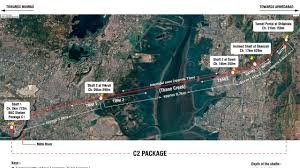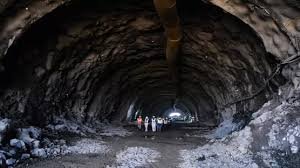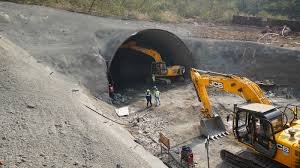In a bid to expedite progress on the ambitious Mumbai-Ahmedabad bullet train project, an additional intermediate tunnel spanning 394 meters has been constructed at Ghansoli in Mumbai. This newly built tunnel will hasten the main tunneling work, which spans 21 kilometers between BKC and Shilphata, near the Thane creek.

As per a statement from the National High-Speed Rail Corporation Limited (NHSRCL), the entity overseeing the bullet train project, the newly constructed terminal, measuring 26 meters in depth and extending over 3.3 kilometers, will facilitate simultaneous access for the creation of approximately 1.6-meter tunnels on each side. For the primary 21-kilometer tunnel, 16 kilometers will be excavated employing tunnel boring machines, while the remaining 5 kilometers will be constructed utilizing the New Austrian Tunneling Method.
Intermediate tunnel to provide direct vehicular access to main tunnel
Excavation for the intermediate tunnel commenced on December 6, 2023, and the entire 394-meter length was completed within six months. This process involved 214 controlled blasts, with 27,515 kg of explosives utilized under expert supervision. The intermediate tunnel is designed to offer direct vehicular access to the main tunnel during both construction and operation phases, and it can also serve as an evacuation route during emergencies.
Construction is progressing swiftly on the 21-kilometer stretch from the Mumbai Bullet Train Station to Shilphata in Maharashtra. Notably, approximately seven kilometers of this tunnel will traverse beneath the Thane creek, marking a first-of-its-kind endeavor in India within an intertidal zone. This single-tube tunnel will accommodate two tracks for the bullet train, which is anticipated to operate at speeds of up to 320 km/hr within the tunnel. Presently, construction of 16 kilometers of the tunnel is underway at BKC, Vikhroli, and Savli, employing tunnel boring machines.
Mumbai- Ahmedabad Bullet train to be operational by 2026
 Railways Minister Ashwini Vaishnaw announced in March that the highly anticipated bullet train project is slated to commence operations by 2026, with initial services running between Surat and Bilimora. Progress on the Mumbai-Ahmedabad bullet train corridor has been steady since its commencement in November 2021, despite initial setbacks stemming from challenges related to land acquisition. The project was inaugurated by Prime Minister Narendra Modi and then-Japanese Prime Minister Shinzo Abe in Ahmedabad on September 14, 2017.
Railways Minister Ashwini Vaishnaw announced in March that the highly anticipated bullet train project is slated to commence operations by 2026, with initial services running between Surat and Bilimora. Progress on the Mumbai-Ahmedabad bullet train corridor has been steady since its commencement in November 2021, despite initial setbacks stemming from challenges related to land acquisition. The project was inaugurated by Prime Minister Narendra Modi and then-Japanese Prime Minister Shinzo Abe in Ahmedabad on September 14, 2017.
The National High-Speed Rail Corporation Limited (NHSRCL) was established on February 12, 2016, under the Companies Act, 2013, with the mandate to finance, construct, maintain, and manage the High-Speed Rail Corridor in India. It operates as a ‘Special Purpose Vehicle,’ with equity participation from the Central Government through the Ministry of Railways, as well as the state governments of Gujarat and Maharashtra. According to the 2015 Joint Feasibility Study, the project was projected to cost Rs 108,000 crore, with an expected completion period of eight years.











Comments 1